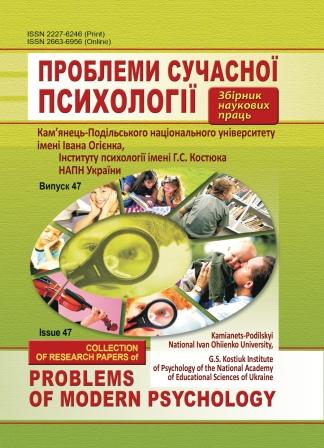Resource’s Richness of Personality
DOI:
https://doi.org/10.32626/2227-6246.2020-47.231-252Keywords:
resource’s richness, psychological resourcefulness, resourcefulness, systemic reflection, ability to self-transformation.Abstract
resource’s richness of the personality.
The following methods are applied: psychological survey using such
techniques as personal’s resource questionnaire, personality’s psychological
resourcefulness questionnaire, diagnostics of existential resources’ indicators
questionnaire, virtue and strength of character questionnaire, crisis coping
questionnaire, psychology and personality questionnaire of uncertainty. Methods
of mathematical and statistical analysis such as multivariate analysis, onefactor
variance analysis, cluster analysis, classification analysis, and correlation
analysis have been applied. The study is based on the Bayer model, which turns
the problem into a solution in which it will be solved.
The results of the research: according to the multivariate analysis (factor
weight > 0,70), which cumulatively explained 57,1% of the variance in the
study group, it was found that factor 1 (44,3%) contains such components
of resource’s richness as psychological survival resources, psychological
resourcefulness, psychological well-being, coherence, existential resources,
strength of character. The content of the second factor (13%) are the indicators
of personal resourcefulness and intolerance for uncertainty. Systemic reflection
prevails over quasi-reflection and introspective reflection in individuals with
high levels of resource’s richness. Changes in the level of resource’s richness are
most due to uncertainty tolerance (rank 100). The inter-correlation between
psychological resourcefulness and other components of resource’s richness is the
closest one. Uncertainty intolerance is the most closely related to psychological
resourcefulness, the components of which are the interpretative codes of the
significance of an event to man. Psychological survival resources are in one
cluster with coherence. The ability of a person to use consciously available
own resources is conditioned by the level of his systemic reflection, which is
incorporated into the resource’s richness through psychological resourcefulness.
Conclusions. It is not important how many psychological resources a person
has, but whether, he or she knows about them and whether they can apply
them according to their life situation. Resource’s richness is characterized as a
reflexively conditioned ability of a person to self-transformation.
References
Водопьянова Н. Психодиагностика стресса. Санкт-Петербург : Питер, 2009. 336 с.
Завалкевич Л. Развитие психологической гибкости как фактор эффективности менеджерской деятельности. Практична психологія та соціальна робота. 2004. № 1. С. 15–29.
Иванова Т., Леонтьев Д., Осин Е., Рассказова Е., Кошелева Н. Современные проблемы изучения личностных ресурсов в профессиональной деятельности. Организационная психология. 2018. Т. 8. № 1. С. 85–121. URL : https://www.orgpsyjournal.hse.ru.
Илюшина М. И. Субъективная ресурсность как психолого-акмеологичeский феномен. Modern Research of Social Problems [Электронный журнал]. 2016. № 12 (68). С. 188–202. URL : https://www.ej.soc-journal.ru.
Кузікова С. Б. Структурно-змістовий аналіз феномену особистісного саморозвитку. Проблеми сучасної психології: Зб. наук. праць Кам’янець-Подільського національного університету імені Івана Огієнка, Інституту психології ім. Г. С. Костюка АПН України / за ред. С. Д. Максименка, Л. А. Онуфрієвої. Кам’янець-Подільський : Аксіома, 2010. Вип. 10. С. 365–377.
Рязанцева О. Ю. Экзистенциальные ресурсы лиц, переживающих психологический кризис: дис. … канд. психол. наук: 19.00.01. Одесса : Южноукраинский национальный педагогический университет имени К. Д. Ушинского, 2012. 343 с.
Савчин М. Методологеми психології: монографія. Київ : Академвидав, 2013. 224 с.
Штепа О. С. Опитувальник психологічної ресурсності особистості: результати розробки й апробації авторської методики. Проблеми сучасної психології: Зб. наук. праць Кам’янець-Подільського національного університету імені Івана Огієнка, Інституту психології імені Г. С. Костюка НАПН України / за наук. ред. С. Д. Максименка, Л. А. Онуфрієвої. Кам’янець-Подільський : Аксіома, 2018. Вип. 39. С. 380–399. URL : https://nbuv.gov.ua/UJRN/Pspl_2018_39_33.
Alessandri, G., Consiglio, C., Luthans, F., & Borgogni, L. (2018). Testing a dynamic model of the impact of psychological capital on work engagement and job performance. Career Development International, 23 (1), 33–47. URL : https://www.emeraldinsight.com/1362-0436.htm.
Downloads
Published
How to Cite
Issue
Section
License
Copyright
The Editorial Board has the full right to publish original scientific papers containing results of theoretical and experimental research works which are not currently subject to review for publication in other scientific editions. The Author shall transfer to the editorial board of the Collection the right to spread the electronic version of the paper, as well as the electronic version of the paper translated into English (for papers originally submitted in Ukrainian and Russian) by all kinds of electronic means (placement at the official website of the Collection, electronic databases, repositories etc).
The Author of an article reserves the right to use materials of the paper, without approval with the editorial board and the founders of this Collection: a) partially or fully, for educational purposes; b) for writing own dissertation papers; c) for preparation of abstracts, conference reports and presentations.
The Author of an article can place electronic copies of the paper (including the final electronic version downloaded from the official website of the Collection) at:
- personal web resources of all Authors (websites, webpages, blogs etc.);
- web resources of the institutions where the Authors are employed (including electronic institutional repositories);
- non-profit public access web resources (for example, arXiv.org).
But in all cases, it is obligatory to have a bibliographic reference to the paper, or a hyperlink to its electronic copy placed at the official website of this Collection.






